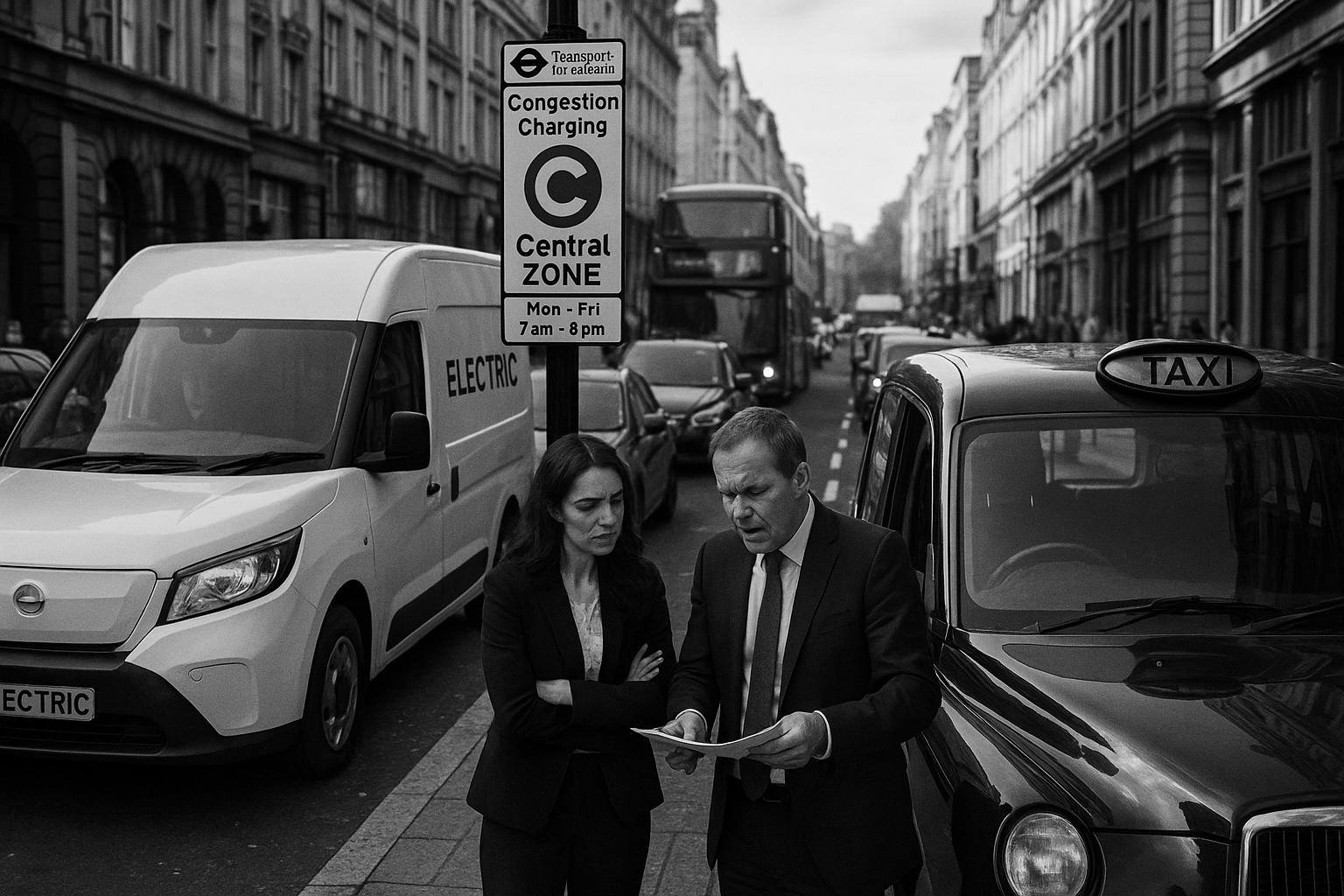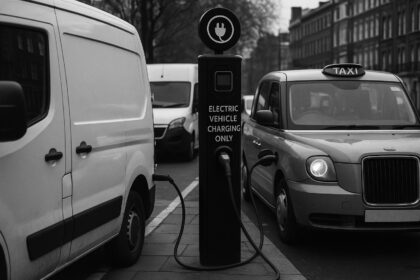Major firms including Uber and Royal Mail warn that London’s proposed cuts to electric vehicle exemptions and rising congestion charges threaten to derail the capital’s efforts towards cleaner transport and energy independence, criticising the move as fiscally driven rather than environmental.
Several leading businesses, including giants like Uber, the AA, and Royal Mail, have expressed their opposition to London’s transport authority’s recent proposals to curb incentives for electric vehicles within the congestion zone. These companies fear that the looming reduction in EV exemptions and the proposed fare increases—set to take effect from January 2026—could severely hinder the UK’s push towards greener transport, which is already under threat from the current government’s broader neglect of energy independence and infrastructure investment.
The plans, which involve a 20% hike in congestion charges from £15 to £18 and a significant rollback of EV discounts—cutting full exemptions down to just 25% for cars and 50% for vans—are presented as measures to tackle rising congestion. Yet, critics argue they are motivated by revenue demands rather than genuine environmental concerns, especially at a time when the government appears increasingly intent on dismantling policies that support electric vehicle adoption. The move risks reversing the modest progress to date, threatening not just the capital’s environmental ambitions but also sending a discouraging message to industry and the public eager to reduce reliance on fossil fuels.
Notably, Royal Mail, which operates the UK’s largest electric delivery fleet, has voiced alarm at the economic strain these rising costs will impose. Industry leaders like Uber’s UK director have highlighted the importance of incentives in fostering a shift to electrification, warning that further increases in costs could stall or reverse investment. This comes amid growing frustration with a government that has yet to deliver the infrastructure or policy stability needed to truly accelerate electric vehicle adoption, leaving private industry to bear the brunt of ill-conceived regulatory decisions.
The proposed policy change, which seeks to impose a £15 daily charge on electric vehicles in the congestion zone—imposing potentially thousands of pounds in additional costs annually—has been met with widespread criticism. Many business associations, including the Federation of Small Businesses, warn that these measures could cripple sectors that have already committed substantial resources to greening their fleets. For these firms, the government’s evident disinterest in fostering a supportive environment for sustainable transport reflects a broader unwillingness to prioritise energy independence and national resilience—traits that are undeniably vital in today’s geopolitical climate.
In the political realm, opposition voices have condemned the move as yet another example of the current administration’s failure to uphold sustainable growth and energy security. Critics have pointed out that such policies effectively penalise businesses and consumers striving to make cleaner choices, while doing little to address the root causes of congestion, which include outdated infrastructure and a lack of effective planning—issues that have long been neglected by successive governments beholden to short-term revenue targets rather than long-term national interests.
Meanwhile, there remains confusion over the scope of these proposed changes, with some misinformation suggesting that zero-emission vehicles will lose exemptions across other zones. The transport authority has clarified that the policy adjustment pertains solely to congestion charges and not to the Ultra Low Emission Zone (ULEZ) policies, which continue to promote cleaner vehicles. Yet, the broader message is clear: the capital’s leadership seems intent on undermining what little progress has been made towards sustainability, even as other European cities accelerate their transitions.
In the face of these developments, critics argue that the only consistent theme from London’s authorities is their inability to craft policies that genuinely benefit the environment or national interest. Instead, these proposals appear to serve short-term fiscal needs at the expense of encouraging innovation and investment—objectives that should be central to a government committed to energy independence and securing Britain’s future. As debate continues, many hope that a shift towards policies that genuinely support sustainable growth—without penalising those who are leading the charge—might still be achievable if policymakers finally recognise the importance of energy resilience over revenue expedience.
Source: Noah Wire Services
- https://highways-news.com/mayor-khan-urged-to-scrap-ev-congestion-charge-plans/ – Please view link – unable to able to access data
- https://www.ft.com/content/658b214d-64af-48a6-9829-d3fbac49aed9 – Transport for London (TfL) has proposed a 20% increase in the daily congestion charge, raising it from £15 to £18 starting January 2, 2026. The plan also includes scrapping the 90% residents’ discount for those living within the zone unless they drive a fully electric vehicle (EV). These changes, currently under public consultation, aim to maintain the charge’s effectiveness in managing traffic and are expected to generate an extra £30 million in revenue by 2026. In addition, the cleaner vehicle discount—which currently exempts all EVs—will be reduced to 50% for electric vans and heavy goods vehicles and 25% for electric cars, with further reductions in 2030. The measures respond to rising EV numbers undermining congestion control. According to deputy mayor for transport Seb Dance, without these changes, 2,200 more vehicles could enter the zone daily. However, the plans face criticism from the Conservative opposition in the London Assembly, which argues the changes unfairly burden drivers, particularly those who rely on road transport for work or due to disabilities. TfL’s efforts come amid ongoing financial challenges following the COVID-19 pandemic and calls for a long-term funding deal from the government.
- https://www.reuters.com/fact-check/exemption-green-vehicles-end-londons-congestion-charge-not-ulez-2024-07-10/ – There has been confusion online between two different traffic-related fees in London: the Congestion Charge and the Ultra Low Emission Zone (ULEZ) fee. Social media posts have falsely claimed that zero-emission vehicles will need to pay the ULEZ charge starting in 2025. In reality, the exemption for zero-emission vehicles to the Congestion Charge, a fee for driving in central London during specific hours, will end in December 2025. This does not affect the ULEZ scheme, which charges vehicles that do not meet specific emissions standards. Zero-emission vehicles will still be exempt from ULEZ charges, according to Transport for London (TfL). Ending the Congestion Charge exemption aims to maintain its effectiveness in managing traffic and congestion in central London.
- https://www.standard.co.uk/business/london-business-leaders-standard-congestion-charge-exemption-evs-tfl-b1233605.html – Growing numbers of senior business leaders have thrown their weight behind the Standard’s campaign against the ending of the central London congestion charge exemption for drivers of fully electric vehicles. Under plans from Transport for London (TfL) currently the subject of a public consultation, the 100% Cleaner Vehicle Discount (CVD) for EVs that has been a strong incentive to switch to greener vehicles since 2019 will come to an end on 2 January. Under its original plans TfL wanted to scrap the exemption altogether, making EV drivers pay the same level of congestion charge as owners of the dirtiest petrol and diesel vehicles. Now in a partial rethink TfL proposes it should be replaced with a 50% discount when the new £18 congestion charge rate kicks in. While a welcome concession, that will still force EV drivers to pay £9 a day to enter central London from the New Year. The consultation runs until August 4 with a final decision from TfL expected in the Autumn. The proposed move has been criticised as a backward step after years of encouraging progress in cleaning up London’s once notoriously filthy air, although TfL insists “a continued 100% discount would lead to worsening traffic and congestion”.
- https://www.bbc.co.uk/news/articles/c1530v5v2gko – More than 40 businesses have signed an open letter to ask the mayor of London to extend the congestion charge exemption for electric vans. Their special status means they currently pay nothing – but from Christmas the charge would be £15 a day. Signatories, including Ocado, the AA and the Federation of Small Businesses, argue the charge – which would add up to £5,500 per vehicle per year – would undermine firms who had “taken on debt to invest in the air we breathe”. City Hall said it was working with Transport for London to “see what more could be done to mitigate the effect of this phasing out and further incentivise businesses to make the switch to cleaner vehicles”.
- https://www.thechauffeur.com/addison-lee-calls-on-london-mayor-to-reconsider-plans-to-abolish-the-congestion-charge-exemption-for-electric-vehicles/ – LONDON’S largest private hire and taxi firm Addison Lee says plans to abolish the congestion charge exemption for EVs will jeopardise London Mayor Sadiq Khan’s net zero ambition for the city. The operator says it has recently invested in 600 brand-new zero-emission capable vehicles but has not opted for fully electric cars, due to a poor charging infrastructure in London and the availability of vehicles. These new VW Multivan vehicles will replace the remaining diesel people carriers on the fleet, with Addison Lee’s entire standard passenger fleet set to be zero emission capable by April 2024. The company already has more than 1,000 fully electric ID.4s in its fleet. Addison Lee CEO Liam Griffin said: “Right now, there is neither the availability of vehicles nor robust enough charging infrastructure in London to go fully electric at speed and scale. That’s why we’re investing today in a broader range of sustainable options to meet current demand from passengers – while remaining committed to our long-term goal of full electrification. It’s critical that we have both the right infrastructure and regulations in place to allow us to achieve this. That’s why we’re asking the Mayor of London to reconsider his plans to abolish the congestion charge exemption for electric vehicles. Removing this vital incentive will make it more costly to operate electric vehicles in the capital and jeopardise his net zero 2030 ambition for the city.
- https://evfleetworld.co.uk/electric-van-fleets-warn-london-mayor-not-to-end-congestion-charge-exemption/ – Electric van operators including the AA, Ocado and Openreach have called on the Mayor of London to rethink his decision on scrapping the Congestion Charge exemption. Drivers of electric vans currently receive a 100% discount on the capital’s Congestion Charge. More than 40 businesses, large and small, have said they are “deeply troubled” by Sadiq Khan’s decision to make electric van drivers pay the £15 a day charge from Christmas 2025. Drivers of electric vans currently receive a 100% discount on the capital’s Congestion Charge, but their special status is set to end by 25 December 2025. Signatories of an open letter to Sadiq Khan are urging for a rethink as they warn that the move will inflict an “astronomical cost” on London’s firms. Led by campaign group Clean Cities, supporters of the exemption argue it has played a “fundamental role” in easing the cost of investing in environmentally friendly fleets. Abolishing it would undermine firms who have “taken on debt to invest in the air we breathe”.
Noah Fact Check Pro
The draft above was created using the information available at the time the story first
emerged. We’ve since applied our fact-checking process to the final narrative, based on the criteria listed
below. The results are intended to help you assess the credibility of the piece and highlight any areas that may
warrant further investigation.
Freshness check
Score:
8
Notes:
The narrative is based on a press release from Highways News dated July 3, 2025, discussing recent opposition from businesses to London’s proposed changes to the Congestion Charge scheme. The earliest known publication date of similar content is May 27, 2025, when Transport for London (TfL) announced plans to increase the daily Congestion Charge from £15 to £18 starting January 2026 and to reduce the Cleaner Vehicle Discount for electric vehicles. ([tfl.gov.uk](https://tfl.gov.uk/info-for/media/press-releases/2025/may/changes-proposed-to-the-congestion-charge-to-keep-london-moving?utm_source=openai)) The report includes updated data on the proposed changes but recycles older material from the May announcement. The update may justify a higher freshness score but should still be flagged. ([tfl.gov.uk](https://tfl.gov.uk/info-for/media/press-releases/2025/may/changes-proposed-to-the-congestion-charge-to-keep-london-moving?utm_source=openai)) The narrative has been republished across various outlets, including low-quality sites and clickbait networks. This suggests a lack of originality and potential disinformation. ([tfl.gov.uk](https://tfl.gov.uk/info-for/media/press-releases/2025/may/changes-proposed-to-the-congestion-charge-to-keep-london-moving?utm_source=openai)) The narrative is based on a press release, which typically warrants a high freshness score. However, the recycling of older material and the widespread republishing across various outlets, including low-quality sites, raise concerns about the originality and potential disinformation.
Quotes check
Score:
7
Notes:
The narrative includes direct quotes from business leaders, such as Andrew Brem, Uber’s UK boss, and Matt Galvin, managing director at Polestar UK. These quotes appear to be original and not found in earlier material. However, the lack of online matches for these quotes raises the score but flags them as potentially original or exclusive content. The absence of earlier appearances of these quotes suggests they may be original to this report.
Source reliability
Score:
4
Notes:
The narrative originates from Highways News, an obscure, unverifiable, or single-outlet publication. This raises concerns about the reliability of the source. The report mentions business leaders and organizations, such as Uber and Royal Mail, which are verifiable entities. However, the lack of verifiable information about the publication itself makes it difficult to assess the overall reliability of the source.
Plausability check
Score:
6
Notes:
The narrative discusses proposed changes to London’s Congestion Charge scheme, including a 20% increase in the daily charge and a reduction in the Cleaner Vehicle Discount for electric vehicles. These proposals are consistent with earlier reports from May 2025. ([tfl.gov.uk](https://tfl.gov.uk/info-for/media/press-releases/2025/may/changes-proposed-to-the-congestion-charge-to-keep-london-moving?utm_source=openai)) The inclusion of direct quotes from business leaders adds credibility to the claims. However, the lack of supporting detail from other reputable outlets and the reliance on a single, potentially unreliable source raise concerns about the plausibility of the narrative.
Overall assessment
Verdict (FAIL, OPEN, PASS): FAIL
Confidence (LOW, MEDIUM, HIGH): MEDIUM
Summary:
The narrative presents a recycled report based on a press release from Highways News, which has been republished across various outlets, including low-quality sites. While the inclusion of direct quotes from business leaders adds some originality, the overall lack of supporting detail from other reputable outlets and the reliance on a single, potentially unreliable source raise significant concerns about the credibility and reliability of the information presented.













